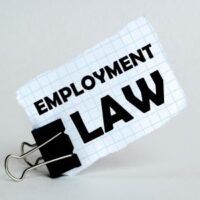DOL Issues Final Rule on Employee-Independent Contractor Classification

The distinction between employees and independent contractors is an important one, but it can also be one of the cloudier issues when it comes to classifying workers. Companies who seek to cut corners and costs may attempt to label a person as a contractor, denying the various benefits that come with the employer-employee relationship. Because the lines are blurred, officials have made many efforts to clarify. Most recently, the US Department of Labor – Wage and Hour Division (WHD) released its Final Rule: Employee or Independent Contractor Classification under the Fair Labor Standards Act (FLSA).
The new analysis provides several factors for determining whether someone is an employee or independent contractor, and it is worth a review if you have concerns about misclassification. A Palm Beach County employment lawyer can assist if your employer has violated the law, since you may have legal recourse for recovering damages. In addition, an overview on employee versus independent contractor offers guidance.
Six Factors for Employee Classification: In the Final Rule, officials listed various points to analyze in determining whether a worker’s status as employee or independent contractor:
- Whether the worker has the opportunity to share in profit and loss of the company based upon their skills, efforts, and contributions;
- Investments by the worker and the company in establishing and maintaining the relationship;
- The permanent nature of the work relationship, as compared to temporary work or single projects;
- The nature and degree of control over the work, and whether it is in the hands of the company or worker;
- How the work performed by the individual factors into the employer’s business, either as a critical, necessary part or a side project; and,
- The skill and initiative of the worker.
The Final Rule states that it is clarifying law and regulations related to FLSA, but the implications extend beyond hours and wages. Misclassification as an independent contractor puts a person at a disadvantage when they should be considered an employee for taxes, workers’ compensation, and many other employment-related issues.
The “ABC” Test Stands: While the Final Rule seeks to clarify the distinction between employees and independent contractors, it does not replace another analysis used in some jurisdictions. The ABC Test focuses on 3 factors, and a person is considered an employee UNLESS:
- The worker has a significant degree of freedom in performing work tasks, such that the company does not control or manage performance;
- The worker does not perform tasks related to the company’s main business operations; and,
- The worker is customarily engaged in the same type of services being provided to the company.
Discuss Details with a Florida Employment Law Attorney
The Final Rule clarifies the distinction between employees and independent contractors, but it is still essential to know your rights in light of employer misconduct. To learn more about misclassification and your legal remedies, please contact Sconzo Law Office in Palm Beach Gardens. Individuals throughout South Florida can call 561-279-6114 or visit our website to set up a free consultation with an experienced employment lawyer.
Source:
dol.gov/agencies/whd/flsa/misclassification/rulemaking

